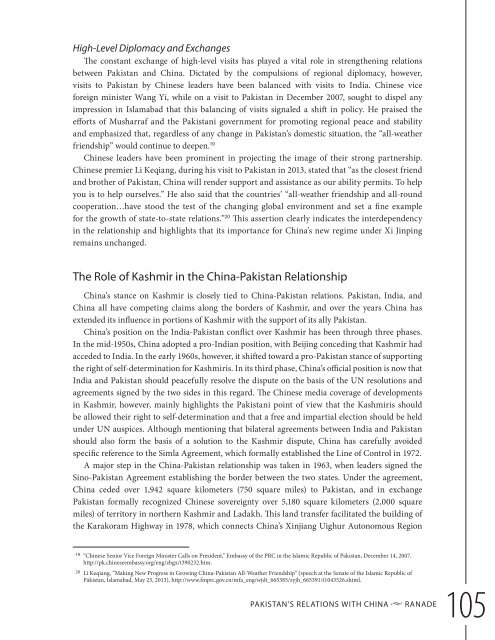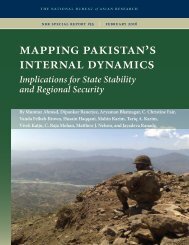pakistan’s
SR55_Mapping_Pakistan_February2016
SR55_Mapping_Pakistan_February2016
Create successful ePaper yourself
Turn your PDF publications into a flip-book with our unique Google optimized e-Paper software.
High-Level Diplomacy and Exchanges<br />
The constant exchange of high-level visits has played a vital role in strengthening relations<br />
between Pakistan and China. Dictated by the compulsions of regional diplomacy, however,<br />
visits to Pakistan by Chinese leaders have been balanced with visits to India. Chinese vice<br />
foreign minister Wang Yi, while on a visit to Pakistan in December 2007, sought to dispel any<br />
impression in Islamabad that this balancing of visits signaled a shit in policy. He praised the<br />
efforts of Musharraf and the Pakistani government for promoting regional peace and stability<br />
and emphasized that, regardless of any change in Pakistan’s domestic situation, the “all-weather<br />
friendship” would continue to deepen. 19<br />
Chinese leaders have been prominent in projecting the image of their strong partnership.<br />
Chinese premier Li Keqiang, during his visit to Pakistan in 2013, stated that “as the closest friend<br />
and brother of Pakistan, China will render support and assistance as our ability permits. To help<br />
you is to help ourselves.” He also said that the countries’ “all-weather friendship and all-round<br />
cooperation…have stood the test of the changing global environment and set a fine example<br />
for the growth of state-to-state relations.” 20 This assertion clearly indicates the interdependency<br />
in the relationship and highlights that its importance for China’s new regime under Xi Jinping<br />
remains unchanged.<br />
The Role of Kashmir in the China-Pakistan Relationship<br />
China’s stance on Kashmir is closely tied to China-Pakistan relations. Pakistan, India, and<br />
China all have competing claims along the borders of Kashmir, and over the years China has<br />
extended its influence in portions of Kashmir with the support of its ally Pakistan.<br />
China’s position on the India-Pakistan conflict over Kashmir has been through three phases.<br />
In the mid-1950s, China adopted a pro-Indian position, with Beijing conceding that Kashmir had<br />
acceded to India. In the early 1960s, however, it shited toward a pro-Pakistan stance of supporting<br />
the right of self-determination for Kashmiris. In its third phase, China’s official position is now that<br />
India and Pakistan should peacefully resolve the dispute on the basis of the UN resolutions and<br />
agreements signed by the two sides in this regard. The Chinese media coverage of developments<br />
in Kashmir, however, mainly highlights the Pakistani point of view that the Kashmiris should<br />
be allowed their right to self-determination and that a free and impartial election should be held<br />
under UN auspices. Although mentioning that bilateral agreements between India and Pakistan<br />
should also form the basis of a solution to the Kashmir dispute, China has carefully avoided<br />
specific reference to the Simla Agreement, which formally established the Line of Control in 1972.<br />
A major step in the China-Pakistan relationship was taken in 1963, when leaders signed the<br />
Sino-Pakistan Agreement establishing the border between the two states. Under the agreement,<br />
China ceded over 1,942 square kilometers (750 square miles) to Pakistan, and in exchange<br />
Pakistan formally recognized Chinese sovereignty over 5,180 square kilometers (2,000 square<br />
miles) of territory in northern Kashmir and Ladakh. This land transfer facilitated the building of<br />
the Karakoram Highway in 1978, which connects China’s Xinjiang Uighur Autonomous Region<br />
19 “Chinese Senior Vice Foreign Minister Calls on President,” Embassy of the PRC in the Islamic Republic of Pakistan, December 14, 2007,<br />
http://pk.chineseembassy.org/eng/zbgx/t390232.htm.<br />
20 Li Keqiang, “Making New Progress in Growing China-Pakistan All-Weather Friendship” (speech at the Senate of the Islamic Republic of<br />
Pakistan, Islamabad, May 23, 2013), http://www.fmprc.gov.cn/mfa_eng/wjdt_665385/zyjh_665391/t1043526.shtml.<br />
PAKISTAN’S RELATIONS WITH CHINA u RANADE<br />
105



